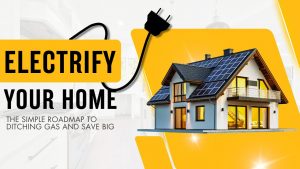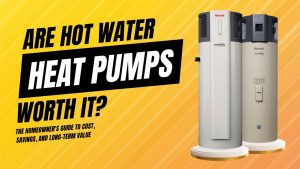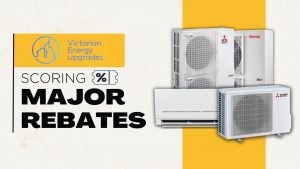What is a Heat Pump Hot Water System?
A heat pump hot water system is an energy-efficient way to heat your water. Instead of using electricity to heat water directly (like traditional electric water heaters), these systems extract heat from the surrounding air. They work similarly to reverse-cycle air conditioners, using a refrigeration cycle to transfer heat from one place to another.
By using this process, heat pump water heaters can reduce electricity usage by about 60% to 75% compared to conventional electric storage water heaters. Pretty impressive, right? This makes them an eco-friendly choice, as they help reduce greenhouse gas emissions and your carbon footprint.
Key Benefits of Heat Pump Water Heaters
There’s a reason why more homeowners are switching to heat pump water heaters, and it’s not just because of the savings on energy bills. Here are some of the standout benefits:
- Lower energy consumption: These systems use much less electricity than traditional electric water heaters, making them much more energy-efficient.
- Cost savings: By reducing energy usage, you’ll see a noticeable decrease in your power bills.
- Environmentally friendly: Less electricity consumption means fewer carbon emissions, making it a greener choice for your home.
- Solar integration: If you have solar panels installed, you can run your heat pump system during the day to make the most of the electricity generated by your solar setup.
How Does a Heat Pump Hot Water System Work?
A heat pump system uses a refrigeration cycle to extract heat from the air around it. This heat is then transferred to a water storage tank via a heat exchanger. Think of it as a refrigerator working in reverse — instead of cooling down the air, it’s warming up your water!

Here’s a simplified breakdown of how it works:
- Evaporator: The evaporator absorbs heat from the surrounding air.
- Compressor: The compressor increases the temperature of the refrigerant gas.
- Heat exchanger: The heated gas passes through a heat exchanger, which heats the water in the storage tank.
- Condenser: The gas cools down and the cycle starts over.
Since the system relies on ambient air temperature, it’s more efficient in warmer climates, but it can still operate in cooler conditions.
Solar Victoria – Hot Water Rebate Criteria
In Victoria, the Solar Victoria – Hot Water Rebate offers significant financial incentives for homeowners looking to install energy-efficient water heating systems like heat pump water heaters. This rebate aims to reduce both upfront costs and ongoing emissions from residential properties.
To be eligible for the Solar Victoria rebate, there are a few key criteria you need to meet:
- You are the owner-occupier of an existing property where the system is to be installed
- The household taxable income of all owners combined is less than $210,000 per year
- The value of the property is under $3 million
- The property address has not already received a hot water or a solar battery rebate under the Solar Homes Program
- The hot water system to be replaced is at least 3 years old from the date of purchase
- You received a Solar Homes rebate and/or loan but have moved house. You can apply for another incentive at your new address as an owner-occupier if the property has not received these rebates before.
Rebates under this program can reduce the initial cost by several hundred dollars, making it more affordable to switch to a heat pump hot water system. Be sure to check the official Solar Victoria website for the latest updates on rebate amounts and eligibility criteria.
Types of Heat Pump Hot Water Systems
There are two main types of heat pump water heaters: integrated and split systems. Each type has its own advantages, so let’s take a closer look.
| Feature | Integrated Systems | Split Systems |
| Design | Heat pump mounted on top of the storage cylinder | Heat pump separate from the storage tank |
| Weight | Heavier due to the single-unit design | Lighter, with components spread out |
| Installation flexibility | Less flexible; outdoor installation required | More flexibility with tank placement |

Integrated Systems:
In these systems, the heat pump and the water storage cylinder are combined into a single unit. They are typically installed outdoors and are a bit heavier compared to split systems. The benefit? You don’t have to deal with refrigerant piping between different components.
Split Systems:
Here, the heat pump and the storage tank are separate. The heat pump is located outside, while the storage tank can be placed inside or outside your home. This gives you more flexibility in installation, and since the components are split, the system is usually lighter.
How Much Does a Heat Pump Hot Water System Cost?
The cost of a heat pump hot water system can vary depending on the size, brand, and installation complexity. On average, you can expect to pay anywhere between $3,000 and $5,000 for the system and installation.
Here’s a basic breakdown:
- System cost: Around $2,500 to $4,000 depending on the model and capacity.
- Installation cost: Typically ranges from $500 to $1,000, depending on whether it’s a straightforward install or involves extra plumbing work.
While this upfront cost may seem steep, it’s essential to consider the long-term savings on energy bills, as well as any rebates you may be eligible for, such as the Solar Victoria rebate.
Efficiency and Energy Savings with Heat Pumps
The efficiency of a heat pump system is one of its biggest selling points. Because they rely on transferring heat from the air rather than generating it from electricity, they use far less energy. This is especially useful in areas with high electricity costs.
If you live in a place where off-peak electricity rates are available, you can take even more advantage of the savings by running the heat pump during off-peak hours. Just make sure your storage tank is large enough to hold all the hot water you’ll need throughout the day.
Heat Losses in Heat Pump Systems
Like all storage-based water heating systems, heat pump water heaters lose some heat through the walls of the storage tank. This is known as standing losses. The larger the cylinder, the more heat can be lost, so for small households, this can end up being a significant proportion of overall energy use.
If you’re going on holiday or won’t be using hot water for a while, it’s a good idea to switch off the heat pump at the switchboard to avoid wasting energy.
Beware of Cheap Offers or ‘Free Upgrades’ in Victoria
If you live in Victoria, you may come across offers for cheap or even free heat pump upgrades. While these deals can sound tempting, it’s important to proceed with caution. Some of these offers come with hidden catches, including poor-quality installations, lower-grade systems, or even misleading terms that may lock you into long-term contracts with hidden fees.
Here are some red flags to watch out for:
- Cheap systems that aren’t energy efficient: Make sure the system you’re getting is from a reputable brand and has good energy efficiency ratings.
- Poor installation quality: Inadequate installation can lead to problems down the road, including inefficiencies and higher running costs.
- Misleading terms and conditions: Read the fine print carefully, especially if the offer seems too good to be true.
Always ensure you’re dealing with a licensed installer and double-check that any rebates are legitimate.
Common Problems Experienced with Cheap Heat Pump Hot Water Systems
When opting for the cheapest heat pump hot water system on the market, or falling for one of those too-good-to-be-true upgrade offers, you could face several common issues:
- Poor performance in colder climates: Some cheaper models struggle to heat water efficiently in cold weather, leading to higher running costs.
- Higher noise levels: Low-quality systems can be much noisier than premium models, which can be a real nuisance if the unit is installed near living areas.
- Frequent breakdowns: Cheaper systems may come with unreliable components, resulting in more frequent repairs or even early system replacement.
- Poor warranty support: Budget systems often come with limited warranties or poor customer support, meaning you could be stuck paying out of pocket for any issues.
Considerations for Cold Climates
While heat pumps can operate in cooler climates, their efficiency decreases when the outside air temperature drops. This is because the system has to work harder to extract heat from colder air, slowing down the reheat rate — that’s the time it takes to heat up the water.
In really cold conditions, some systems come with an electric boost element to help speed things up. But be aware that using this boost feature will increase the system’s running costs.
How Much Money Will a Heat Pump Hot Water System Save?
While the initial cost of a heat pump hot water system is higher than traditional electric systems, the long-term savings are where it really shines. You can expect to save between $300 and $1,000 per year on your energy bills, depending on your household size and water usage.
By reducing electricity consumption by up to 75%, heat pumps offer substantial savings, especially if you’re using a cheaper off-peak tariff or have a solar PV system.
Heat Pump Savings Scenarios in Victoria
Let’s take a look at a few different savings scenarios based on household size and energy tariffs in Victoria.
| Household Size | Estimated Annual Savings | Time to Break Even (including rebate) |
| 1-2 people | $300 – $400 | 5-7 years |
| 3-4 people | $500 – $700 | 4-6 years |
| 5+ people | $800 – $1,000 | 3-5 years |
These figures assume typical electricity tariffs and standard usage patterns. The addition of solar PV can further enhance savings.
Optimal Sizing for Household Needs
One of the most important decisions when choosing a heat pump hot water system is making sure the storage tank is the right size for your household. If the tank is too small, you might run out of hot water during peak usage times. But if it’s too large, the standing heat losses can waste energy.
Here’s a rough guide to help you choose the right size:
| Household Size | Recommended Tank Size |
| 1-2 people | 160-250 litres |
| 3-4 people | 250-315 litres |
| 5+ people | 315-400 litres |
Noise Levels and Installation Considerations
Heat pumps do make some noise when they’re running, mostly from the fan and compressor. The noise level can vary between models, so it’s a good idea to ask about this when you’re getting quotes.
For installation, try to place the unit in a location where noise won’t disturb your family or neighbours. A spot away from bedrooms and living areas is usually ideal.
Use of Timers and Solar Integration
Many modern heat pump systems come with built-in timers, which can be handy if you have rooftop solar panels. You can set the system to operate during the day when your solar panels are generating electricity, which further reduces your reliance on the grid.
Running Costs of Heat Pump Water Heaters
Heat pump water heaters are far cheaper to run than electric storage heaters. On average, they use around a third of the electricity, and when combined with off-peak tariffs or solar energy, the savings can be even greater. However, the upfront cost of a heat pump system is generally higher, so it’s important to weigh up the long-term savings against the initial investment.
Suitable Conditions for Heat Pump Efficiency
Heat pump systems work best in warmer climates, where they can extract more heat from the surrounding air. But don’t worry if you live in a colder area — these systems will still work, although they may take a little longer to heat the water.
Pros and Cons of Heat Pump Hot Water Systems
Like any system, heat pump hot water heaters have their advantages and drawbacks. Here’s a quick look at the pros and cons:
| Pros: | Cons: |
| Energy-efficient: Can reduce electricity usage by 60-75%. Eco-friendly: Reduces carbon footprint and greenhouse gas emissions. Cost savings: Significant long-term reductions in energy bills. Government rebates: Available rebates make it more affordable upfront. Solar integration: Works well with solar PV systems. | High upfront cost: More expensive than traditional electric systems. Performance in cold weather: Efficiency decreases in colder climates. Noise: Some systems can be noisy, depending on the model. Size: Larger systems take up more space, and some may require outdoor installation. |
Conclusion: Why Choose a Heat Pump Hot Water System?
Heat pump hot water systems are an excellent choice for those looking to reduce their energy usage, save on electricity bills, and make their homes more environmentally friendly. They’re efficient, cost-effective in the long run, and come with various government rebates and incentives to make the initial investment easier to manage. If you’re looking to upgrade your hot water system, it’s definitely worth considering a heat pump — your wallet and the planet will thank you!
Frequently Asked Questions About Heat Pump Hot Water Systems
Do heat pumps work in cold climates?
Yes, though they are more efficient in warmer temperatures. Cold climates may require a system with an electric boost to ensure hot water is available quickly.
How much can I save on my energy bills?
On average, a heat pump system can reduce your electricity usage for hot water by up to 75%, which could lead to significant savings on your energy bills.
How noisy are heat pump systems?
Most systems produce a noise similar to an air conditioner. However, it’s always good to ask about the decibel level before purchasing.
Can I use my heat pump with solar panels?
Absolutely! Many homeowners use timers to run their heat pump systems during the day when their solar panels are generating electricity, further reducing running costs.
What’s the lifespan of a heat pump system?
With proper maintenance, most heat pump systems can last for 10-15 years or more.










